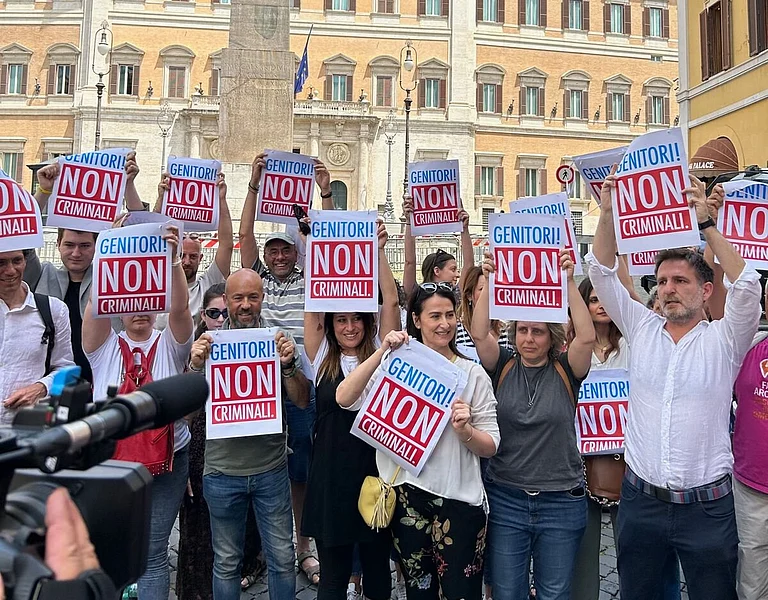Mass protests have erupted in Georgia following the government’s decision to postpone its bid to join the European Union until 2028. The demonstrations, which began last week, have escalated into violent clashes, leading to over 300 protestors being arrested.
Russia Vs EU Plays Out On The Streets Of Georgia
The protests across Georgia are against the government's decision to postpone its bid to join the EU and also reflect broader discontent with the pro-Russia Georgian Dream regime.
Georgia's pro-Moscow government is fresh off parliamentary elections, denounced as rigged by its critics.
Prime Minister Irakli Kobakhidze announced on Thursday that the government would delay talks to join the European Union until 2028 and reject EU funding during this period. The protests across Georgia are not only against this decision but also show broader discontent with the Georgian Dream (GD) regime.
Hundreds of thousands of protesters have gathered over six nights of ongoing protests that began on November 28 and have surrounded the Georgian parliament, with fire seen coming from the building.
Authorities have responded by using water cannons and tear gas to disperse the crowd. Videos show police violently attacking unarmed demonstrators. Protesters were seen throwing fireworks at officers and building barricades on the main boulevard in the capital, Tbilisi.
Many detainees were reported to have been tortured, with some needing hospitalisation. Dozens were injured, including journalists. President Salome Zourabichvili, a critic of the ruling Georgian Dream party, joined the protests and condemned the violence, stating that a lot of the arrested protesters suffered severe head and face injuries.
Why are the people protesting?
Georgian Prime Minister Irakli Kobakhidze made the announcement regarding postponement of the EU bid citing accusations of "blackmail" by the European Parliament, after it criticised Georgia’s October 26 parliamentary elections for having “significant irregularities”.
“We have decided not to bring up the issue of joining the European Union on the agenda until the end of 2028,” he said.
In December 2023, Georgia was granted EU candidate status, sparking major celebrations as thousands of Georgians gathered around Freedom Square in the capital, Tbilisi. However, the mood has since shifted, and the same streets are now filled with protests.
Since Kobakhidze’s government came to power in October, the EU had paused Georgia’s accession process and reduced financial support. This decision was driven by concerns over the government’s controversial laws, such as restrictions on foreign agents and LGBTQ rights, which were viewed as undermining democratic freedoms and leaning toward Moscow’s authoritarian influence.
In October, Georgia’s election commission announced that the ruling Georgian Dream party had won a majority with 54 per cent of the vote. However, the results were met with widespread accusations of fraud. Georgia’s pro-Western president, Salome Zourabichvili, called the election a “total falsification” and urged opposition supporters to protest outside parliament. Both Zourabichvili and opposition leaders demanded the annulment of the results, claiming the polls were rigged.
International observers, including the US and EU, supported calls for an independent investigation into the election. The EU froze Georgia’s bid for membership, citing concerns about “democratic backsliding”. This decision has been especially disappointing for the estimated 89 per cent of Georgians who favour joining the EU.
Why is the Georgian Dream Party regime being criticised?
In the October 2024 parliamentary elections, the ruling Georgian Dream party claimed a significant victory, but the results triggered mass protests in Tbilisi amid allegations of electoral rigging. The election results came amidst the backdrop of growing discontent of the GD party over its anti-Western policies, which many believe are undermining Georgia’s Euro-Atlantic ambitions.
A key flashpoint has been the controversial "foreign agents" law, passed in August. The legislation requires NGOs and independent media receiving over 20 per cent of their funding from abroad to register as representing "foreign interests." Critics, who have dubbed it the "Russian law," fear it could be weaponized to curtail civil liberties and suppress dissent.
In September, Georgian politicians approved a law aimed at "family values and protecting minors," which imposed severe restrictions on LGBTQ rights. The law allowed authorities to ban Pride events, public displays of the rainbow flag, and even censor films and books. It also prohibited gender transitions, adoption by gay and transgender people, and rejected same-sex marriages performed abroad.


